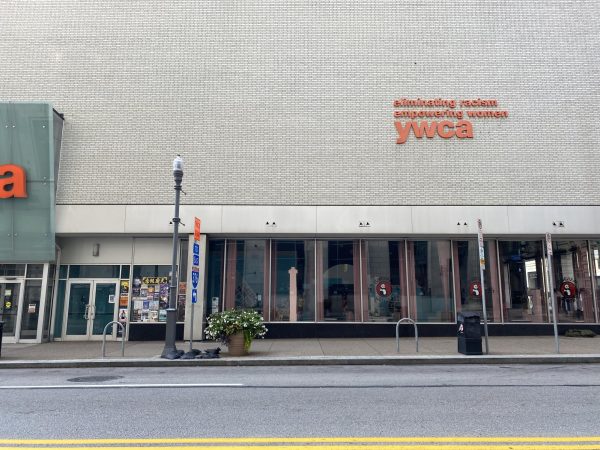City amends marijuana bill, university stays put

After Ezal Pavlichko was fined heavily and tossed out of his dormitory for breaking Point Park’s drug policies this year, he was shocked to find out that Pittsburgh City Council has recently voted to decriminalize possession of small amounts of marijuana within city limits.
Following the passing of the Marijuana Decriminalization Bill, if a person is found in Pittsburgh in possession of 30 grams of marijuana or less, they will receive a summary citation punishable by a fine of $25 . However, this does not affect Point Park’s existing drug policies on or off campus.
Despite the liberalization of marijuana policy in the city, rules for marijuana possession at Point Park will not be modified, leaving individuals like Pavlichko wondering if he is being unfairly prosecuted.
By living on campus, Point Park students consent to searches if administrators have reason to believe drug laws are being broken.
If evidence is found or turned over, administrators charge students with violations and put them into the university’s judicial review process through the Office of Student and Resident Life.
If found guilty of drug possession, students face a tiered reprimand system, with results ranging from fines to housing termination with the potential for suspension or expulsion.
“When a student gets fined or caught with marijuana on campus, it does not go on any kind of police record, and the only thing that is kept on file is the number of offenses the student has so the police can track that,” said Point Park Narcotics Officer Jeremy Bogdanski.
Dean of Students and Associate Vice President of Student Affairs Keith Paylo said these policies will not be changed to fit the new city ordinance.
“In the state of Pennsylvania, it is an illegal substance and I guess it all depends on where you sit on the fence of the impact that a drug like marijuana can have on someone’s life, body and welfare,” Paylo said. We have crafted and carry out policies that show that we do not subscribe to or allow illegal drugs on this campus.”
Pittsburgh city councilman and sponsor of the Marijuana Decriminalization Bill Daniel Lavelle hopes places, such as Point Park, will reconsider such stances.
“I think for so long our country has been led to believe certain things about marijuana, and now, as our populace becomes more educated, and people begin to dive deeper into the motives behind governmental ban of marijuana, the war on drugs and things of that nature, they’re beginning to see that the ban is not really due to health concerns, but that it’s because of social issues,” Lavelle said in a phone interview.
His motivation behind this bill was to spread equality and fairness to people throughout the city who deserve better treatment.
The councilman has been in support of this movement for a long time, and firmly believes that marijuana use should not be treated as a criminal offense.
While he agrees that the university can set its own policies, he hopes it will reconsider them.
“I can certainly understand the University saying that you cannot smoke within our dorm rooms and you cannot smoke within our buildings, but at the same time I would say we don’t want to expel the student for that offense, and that there are probably more productive ways, via fines or community work, to deal with that student, and I would hope the universities move more in that direction instead of stripping someone of their ability to get an education,” Lavelle said.
Even though fines play a large role in punishment at Point Park, the drug and alcohol programs have been less creative in helping reduce drug use on campus. Currently, the programs available to students in need only include online classes.
Lavelle believes that if the goal is education around the dangers of drug use, then the programs should be more substantial. He suggested that students could be put into a situation with hospitals throughout the city so that they can see and understand what the consequences of drug use can be.
“Maybe they could be put in a place where they see individuals who unfortunately have begun to abuse the drugs, because my assumption is that the real goal is to ensure no addiction is taking place, and that it doesn’t become harmful to the student because I would hope the programs are made to better help the student understand that aspect of it,” Lavelle suggested.
As a student at Point Park, whether one lives on campus or off, the student can still be processed and fined through the school’s police department, regardless of the new city laws.
“If a student is not on campus, then I would hope that the colleges and universities follow the lead of the city,” Lavelle said.
Pavlichko, a freshman civil engineering major at Point Park, has experienced this process firsthand.
He was absent from his dorm room in Thayer Hall when the police came to search his room. In his room, they found Pavlichko’s roommate, marijuana paraphernalia and alcohol. The police confiscated the substances and charged him, although they could not prove the contraband was his.
“[Point Park Police] told me it’s one man’s word against another,” Pavlichko said.
Pavlichko was fined $550 for this single offense. Under the new city ordinance, he would have paid as little as $25. The second time he was caught, he lost his housing contract and was given two weeks to move his belongings and move into an apartment off of school grounds. He was also barred from entering any residential halls or any campus buildings after certain times for the rest of the year.
“I wasn’t even on campus; I was down at the [Mon Wharf] around 3 o’clock in the morning shortly after winter break with a group of people, and then PPU police came through,” Pavlichko said.
All told, he lost about $200 in flex food dollars and only received about $400 back from his housing contract. Pavlichko also had to pay for a whole new meal plan and fill out new paperwork because he was considered a commuter.
“I was really upset by the thought of losing my scholarship, education, where I was going to live and on top of all of that worry, I had to focus on school while juggling what was going to come up next with this,” Pavlichko said.
He claims to have asked about a drug program to help himself, and the officer who was dealing with his case told him that the school does not have any programs available. However, he found out that after a person’s first offense, they can take an online class that requires an individual to select the best answer for certain drug related scenarios.
Dean Paylo is confident these drug and alcohol programs are influential, educational and preventive.
He also believes it is fair to keep harsher sanctions for the fact that Point Park is a private institution, which means they do have the freedom to implement many policies in the way they wish to. However, they still have to maintain a good relationship within state and federal laws.
“Students can see all of those various things that we do in trying to educate them drug and alcohol wise; it is a deterrent in some way, shape or form if a student believes they will be fined, but it has to go beyond that…it has to go to educating the student to make them understand what the ramifications are of drug use, which are many,” Paylo said.
The idea that marijuana laws could drastically change within the next few years is a possible reality that many educators will have to consider.
“I will have to take it under serious advisement as to how or if the policies and procedures we have in place right now will have to be adjusted accordingly within the next few years,” Paylo said. “I will have to take everything with these new laws under advisement and how it impacts the university and how we do things here.”




